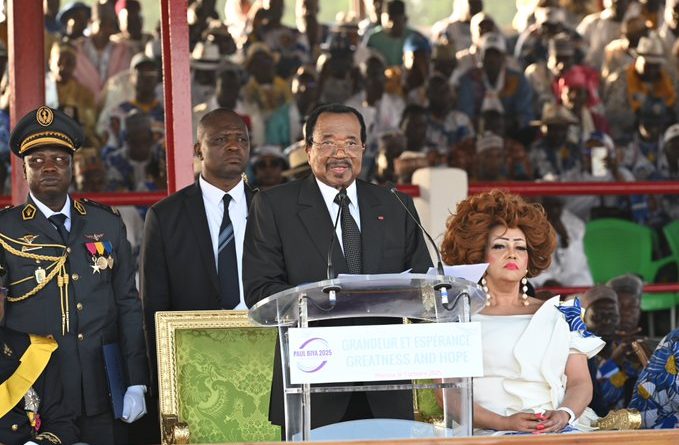Paul Biya, in power since 1982, declared winner of Cameroon’s presidential election
Cameroon’s longtime leader, Paul Biya, has been declared the winner of the country’s 12 October presidential election, extending his rule into a fifth decade, according to official results.
Mr Biya’s announcement came amid widespread allegations of electoral fraud and growing political tensions.
The Constitutional Council on Monday announced that the 92-year-old president had secured 53.66 per cent of the vote, defeating his main challenger and former minister, Issa Bakary, who garnered 35.19 per cent.
The council said voter turnout stood at 57.76 per cent, significantly lower than the 67 per cent average recorded over the last three elections.
The result gives Mr Biya, the world’s oldest head of state, an eighth consecutive term in office.
This could see him remain in power until 2032, when he will be nearly 100 years old.
Tense vote and rising unrest
According to the BBC, Monday’s proclamation came amid heightened tension across Cameroon.
In Douala, the country’s commercial hub, BBC reported that at least four people were killed on Sunday in clashes between protesters and security forces. Many shops and schools in the capital, Yaoundé, remained closed out of fear of unrest.
Opposition supporters have defied a ban on protests, accusing the ruling Cameroon People’s Democratic Movement (CPDM) of attempting to “steal victory.”
Mr Bakary, who served as Mr Biya’s communications minister before turning opponent, rejected the official figures, insisting he won 55 per cent of the vote based on his party’s parallel tally.
Shortly after the results were announced, Mr Bakary alleged that security forces opened fire outside his residence in Garoua, his home city and stronghold in the country’s north.
“Right now at my home in Garoua, they are firing on civilians camped outside. The assault has begun,” he posted on social media.
Unfulfilled Promises and a Fragile Nation
Mr Biya is returning as Cameroon faces deep political, economic, and security crises.
The president, who came to power in 1982 after succeeding Ahmadou Ahidjo, initially promised liberal reforms but has since entrenched his grip on power through constitutional changes and tightly controlled elections.
Under his watch, Cameroon has struggled with a violent separatist insurgency in its English-speaking northwest and southwest regions. Separatist groups, who have been fighting for independence since 2017, boycotted the recent election and threatened residents who attempted to vote, according to an analysis by Africa Report.
Meanwhile, unemployment among young people under 35 remains at around 40 per cent, and infrastructure decay from potholed roads to crumbling hospitals continues to deepen public frustration.
But Mr Biya’s supporters point to his record in expanding education infrastructure and his handling of the Bakassi Peninsula dispute with Nigeria, which ended peacefully in Cameroon’s favour.
However, critics say these achievements have been overshadowed by corruption, repression, and economic stagnation.
A Contested Victory
Despite being widely expected to win, Mr Biya’s victory has drawn scepticism from both local and international observers. Opposition groups accuse the government of vote rigging, intimidation, and ballot stuffing, allegations the ruling party strongly denies.
According to Africa Report, Mr Biya reportedly offered Mr Bakary the post of prime minister as a conciliatory gesture following the tense campaign, but the opposition leader refused, saying his goal was to uphold what he called the “truth of the ballot box.”
The Constitutional Council reported that other candidates performed poorly in the vote: Cabral Libii secured 3.41 per cent, Bello Maïgari 2.45 per cent, Tomaïno Njoya 1.66 per cent, and Joshua Osih 1.21 per cent. The rest failed to reach 1 per cent.
Analysts warn that the latest election could push Cameroon closer to political instability if the opposition continues to reject the outcome. The country has seen similar crises before, notably in 1992 and 2018, when opposition figures John Ndi and Maurice Kamto declared themselves winners, only to be sidelined by state power.
An ageing Leader Holding On
Mr Biya’s advanced age and frequent absences from public life have long fueled speculation about his health. Known for spending extended periods outside Africa, the president has faced recurring rumours of ill health and even death, which the government regularly dismisses.
During this year’s campaign, Mr Biya appeared only once at a rally, telling supporters that “the best is still to come.”
Critics argue that his continued leadership offers little hope for change in a country facing mounting challenges.
If he completes his new seven-year term, Mr Biya will have ruled Cameroon for half a century, rivalling the longevity of Teodoro Nguema, his counterpart in neighbouring Equatorial Guinea, who remains Africa’s longest-serving president.

